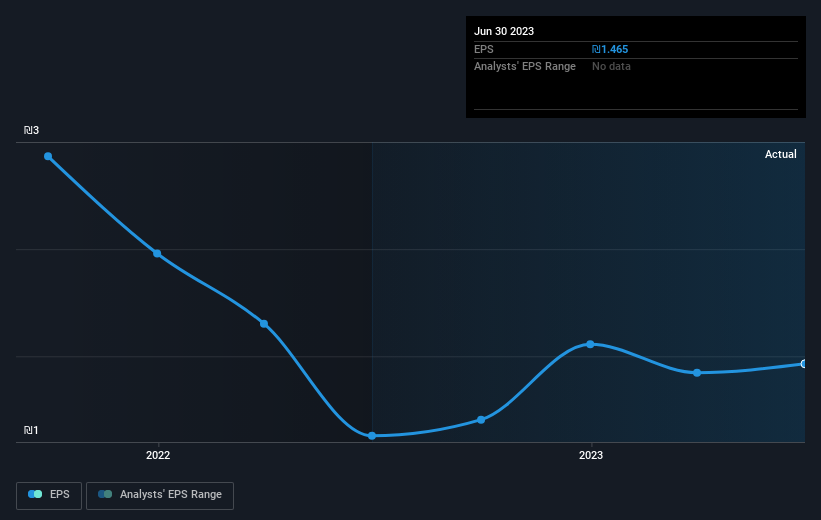Stock Analysis
- Israel
- /
- Food and Staples Retail
- /
- TASE:WLFD
The three-year shareholder returns and company earnings persist lower as Willy-Food Investments (TLV:WLFD) stock falls a further 12% in past week

Investing in stocks inevitably means buying into some companies that perform poorly. But long term Willy-Food Investments Ltd (TLV:WLFD) shareholders have had a particularly rough ride in the last three year. Sadly for them, the share price is down 60% in that time. The more recent news is of little comfort, with the share price down 50% in a year. The falls have accelerated recently, with the share price down 31% in the last three months.
After losing 12% this past week, it's worth investigating the company's fundamentals to see what we can infer from past performance.
View our latest analysis for Willy-Food Investments
There is no denying that markets are sometimes efficient, but prices do not always reflect underlying business performance. One way to examine how market sentiment has changed over time is to look at the interaction between a company's share price and its earnings per share (EPS).
Willy-Food Investments saw its EPS decline at a compound rate of 7.4% per year, over the last three years. This reduction in EPS is slower than the 26% annual reduction in the share price. So it seems the market was too confident about the business, in the past. This increased caution is also evident in the rather low P/E ratio, which is sitting at 11.00.
The company's earnings per share (over time) is depicted in the image below (click to see the exact numbers).

We're pleased to report that the CEO is remunerated more modestly than most CEOs at similarly capitalized companies. But while CEO remuneration is always worth checking, the really important question is whether the company can grow earnings going forward. It might be well worthwhile taking a look at our free report on Willy-Food Investments' earnings, revenue and cash flow.
What About Dividends?
It is important to consider the total shareholder return, as well as the share price return, for any given stock. The TSR is a return calculation that accounts for the value of cash dividends (assuming that any dividend received was reinvested) and the calculated value of any discounted capital raisings and spin-offs. Arguably, the TSR gives a more comprehensive picture of the return generated by a stock. We note that for Willy-Food Investments the TSR over the last 3 years was -53%, which is better than the share price return mentioned above. This is largely a result of its dividend payments!
A Different Perspective
While the broader market lost about 20% in the twelve months, Willy-Food Investments shareholders did even worse, losing 50% (even including dividends). However, it could simply be that the share price has been impacted by broader market jitters. It might be worth keeping an eye on the fundamentals, in case there's a good opportunity. Unfortunately, last year's performance may indicate unresolved challenges, given that it was worse than the annualised loss of 0.5% over the last half decade. Generally speaking long term share price weakness can be a bad sign, though contrarian investors might want to research the stock in hope of a turnaround. While it is well worth considering the different impacts that market conditions can have on the share price, there are other factors that are even more important. Like risks, for instance. Every company has them, and we've spotted 3 warning signs for Willy-Food Investments (of which 2 are potentially serious!) you should know about.
If you would prefer to check out another company -- one with potentially superior financials -- then do not miss this free list of companies that have proven they can grow earnings.
Please note, the market returns quoted in this article reflect the market weighted average returns of stocks that currently trade on Israeli exchanges.
Valuation is complex, but we're here to simplify it.
Discover if Willy-Food Investments might be undervalued or overvalued with our detailed analysis, featuring fair value estimates, potential risks, dividends, insider trades, and its financial condition.
Access Free AnalysisHave feedback on this article? Concerned about the content? Get in touch with us directly. Alternatively, email editorial-team (at) simplywallst.com.
This article by Simply Wall St is general in nature. We provide commentary based on historical data and analyst forecasts only using an unbiased methodology and our articles are not intended to be financial advice. It does not constitute a recommendation to buy or sell any stock, and does not take account of your objectives, or your financial situation. We aim to bring you long-term focused analysis driven by fundamental data. Note that our analysis may not factor in the latest price-sensitive company announcements or qualitative material. Simply Wall St has no position in any stocks mentioned.
About TASE:WLFD
Willy-Food Investments
Imports, exports, markets, and sells food products in Israel.
Flawless balance sheet and good value.

